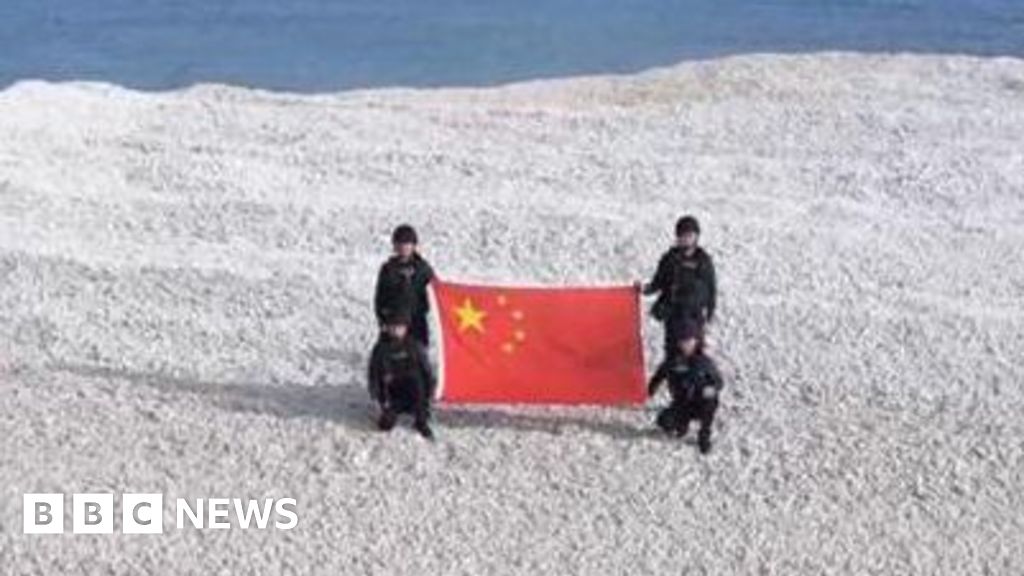Beijing's South China Sea Grab: Control of a Tiny Sandbank, A Giant Power Play
China's assertive actions in the South China Sea continue to escalate tensions across the region. The recent focus on a seemingly insignificant sandbank highlights Beijing's broader strategy of incremental encroachment and the implications for international law and regional stability. This isn't just about a small patch of land; it's a calculated move with significant geopolitical ramifications.
The Subi Reef Situation: A Microcosm of China's Strategy
The current point of contention revolves around Subi Reef (Zhubi Jiao in Chinese), a small, previously uninhabited sandbank in the Spratly Islands. China's extensive reclamation and militarization efforts have transformed this featureless reef into a heavily fortified artificial island, complete with airstrips, radar systems, and military installations. This blatant disregard for international maritime law, specifically the United Nations Convention on the Law of the Sea (UNCLOS), has drawn considerable international condemnation.
- Reclamation and Militarization: China's actions are not merely about territorial claims. The scale of construction on Subi Reef, and other features in the Spratly Islands, demonstrates a clear intent to project power and control over crucial shipping lanes and vital resources.
- International Law Violation: China's claims in the South China Sea, including its expansive "nine-dash line" claim, are widely contested and largely unsupported by international law. The construction and militarization of Subi Reef directly contradict UNCLOS provisions.
- Regional Instability: China's aggressive actions have increased tensions with neighboring countries, such as Vietnam, the Philippines, Malaysia, Brunei, and Taiwan, all of whom have overlapping claims in the region. This creates a volatile environment with the potential for miscalculation and conflict.
Beyond Subi Reef: The Broader Implications
The control of Subi Reef is not an isolated incident. It represents a larger pattern of China's assertive behavior in the South China Sea, including:
- Increased Naval Presence: China's naval patrols and exercises in the region have grown significantly, further solidifying its presence and intimidating neighboring countries.
- Fishing Disputes: China's assertive fishing practices in disputed waters have led to frequent clashes with other claimant states.
- Economic Coercion: China has been accused of using economic leverage to pressure smaller countries into accepting its claims.
The consequences of China's actions extend beyond the immediate region. The South China Sea is a critical waterway for global trade, and any disruption could have significant economic repercussions worldwide. The precedent set by China's actions in the South China Sea also poses a challenge to the international rules-based order.
The Path Forward: Diplomacy and International Cooperation
Addressing the challenges posed by China's actions in the South China Sea requires a multifaceted approach:
- Strengthening International Norms: Reinforcing the UNCLOS and other international laws relating to maritime boundaries is crucial to counter China's disregard for international norms.
- Multilateral Diplomacy: Continued diplomatic efforts among concerned countries are necessary to address the issues peacefully and find mutually acceptable solutions.
- Enhanced Regional Cooperation: Strengthening cooperation among ASEAN countries and other stakeholders can create a unified front against China's assertive policies.
The situation in the South China Sea, particularly the ongoing dispute over Subi Reef, demands careful attention from the international community. Failure to address China's aggressive actions could have far-reaching consequences for regional stability and the global rules-based order. The seemingly insignificant sandbank represents a major geopolitical power play, highlighting the urgent need for diplomatic engagement and a reaffirmation of international law.
Keywords: South China Sea, Subi Reef, China, Spratly Islands, UNCLOS, nine-dash line, maritime dispute, geopolitical tensions, international law, regional stability, military build-up, reclamation, artificial island.

